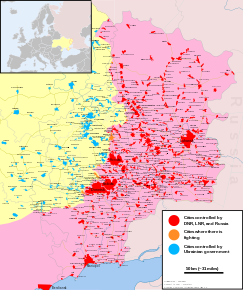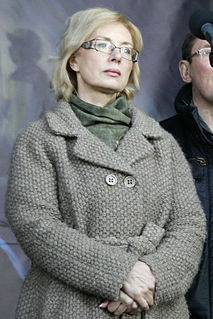| |||||||||||||||||
| |||||||||||||||||
158,399 deputies [3] / 10,051 mayors [4] | |||||||||||||||||
|---|---|---|---|---|---|---|---|---|---|---|---|---|---|---|---|---|---|
| |||||||||||||||||
Results of the 2015 Ukrainian local elections by oblast. | |||||||||||||||||
On 25 October 2015 local elections took place in Ukraine. [5] The elections were conducted a little over a year since the 2014 snap local elections, which were only held throughout parts of the country. A second round of voting for the election of mayors in cities with more than 90,000 residents where no candidate gained more than 50% of the votes were held on 15 November 2015. [6] [7] [8]
Contents
- Background
- Elections in Crimea and Donbass
- Changes in the law
- Results
- Election summary
- Mayor (selected cities)
- Voter turnout
- Conduct
- Absence of elections in areas of the Donbass
- Re-mayoral elections in Kryvy Rih
- Notes
- References
- External links
Because of the ongoing conflict in East Ukraine and the February 2014 annexation of Crimea by Russia, local elections were not conducted throughout all of the administrative subdivisions of Ukraine. [9]

The War in Donbass is an armed conflict in the Donbass region of Ukraine. From the beginning of March 2014, protests by pro-Russian and anti-government groups took place in the Donetsk and Luhansk oblasts of Ukraine, commonly collectively called the "Donbass", in the aftermath of the 2014 Ukrainian revolution and the Euromaidan movement. These demonstrations, which followed the annexation of Crimea by the Russian Federation, and which were part of a wider group of concurrent pro-Russian protests across southern and eastern Ukraine, escalated into an armed conflict between the separatist forces of the self-declared Donetsk and Luhansk People's Republics, and the Ukrainian government. In the Donetsk People's Republic, from May 2014 until a change of the top leadership in August 2014, some of the top leaders were Russian citizens. According to the Ukrainian government, at the height of the conflict in mid-2014, Russian paramilitaries were reported to make up between 15% to 80% of the combatants.

The Crimean Peninsula was annexed by the Russian Federation, from Ukraine, in February–March 2014 and since then has been administered as two Russian federal subjects—the Republic of Crimea and the federal city of Sevastopol. The annexation followed a military intervention by Russia in Crimea that took place in the aftermath of the 2014 Ukrainian revolution and was part of wider unrest across southern and eastern Ukraine.

Crimea is a peninsula on the northern coast of the Black Sea in Eastern Europe that is almost completely surrounded by both the Black Sea and the smaller Sea of Azov to the northeast. It is located south of the Ukrainian region of Kherson, to which it is connected by the Isthmus of Perekop, and west of the Russian region of Kuban, from which it is separated by the Strait of Kerch though linked by the Crimean Bridge. The Arabat Spit is located to the northeast, a narrow strip of land that separates a system of lagoons named Sivash from the Sea of Azov. Across the Black Sea to its west is Romania and to its south Turkey.
The highest number of seats were won by the Petro Poroshenko Bloc "Solidarity", Fatherland and Our Land parties, [10] followed by the Opposition Bloc and the Radical Party. [10] The Petro Poroshenko Bloc did well in the western regions, central Ukraine, and the Kherson Oblast of the south. [11] [12] The Opposition Bloc gained most of the votes of the south and east (except Kharkiv Oblast). [11] [12] In the west, Svoboda improved its performance compared with previous year's parliamentary election. [11]

The Petro Poroshenko Bloc "Solidarity", is a political party in Ukraine, formed on 27 August 2014. However, it has its roots in a parliamentary group called Solidarity dating from 2000 and has existed since in various forms as a political outlet for Petro Poroshenko.
The All-Ukrainian Union "Fatherland", often referred to as Batkivshchyna even in English, is a Ukrainian political party led by Yulia Tymoshenko. The party has been an observer member of the European People's Party (EPP) since 2008.

Our Land is a political party in Ukraine.
A total of 132 political parties took part in the elections. [13] The political parties contested for the 1,600 regional council seats in 22 regional parliaments, more than 10,700 local councils and mayoral seats. [14] The voter turnout was 46.62% of the population. [15] During the second round, the voter turnout dropped to 34.08%. [6]





















